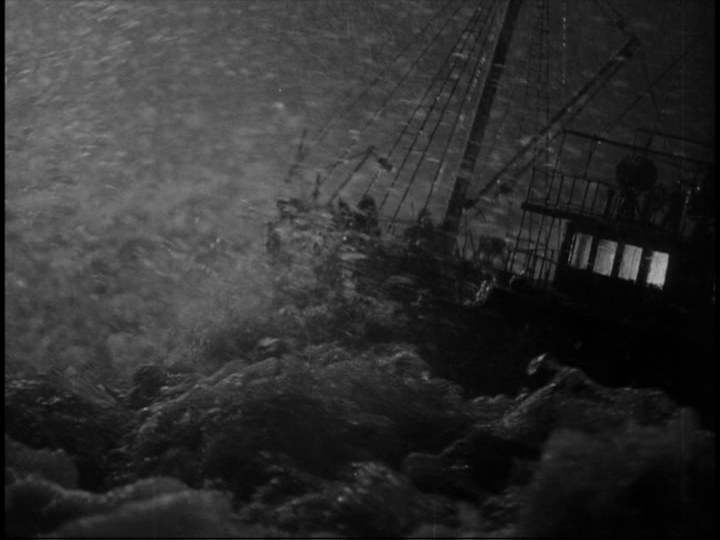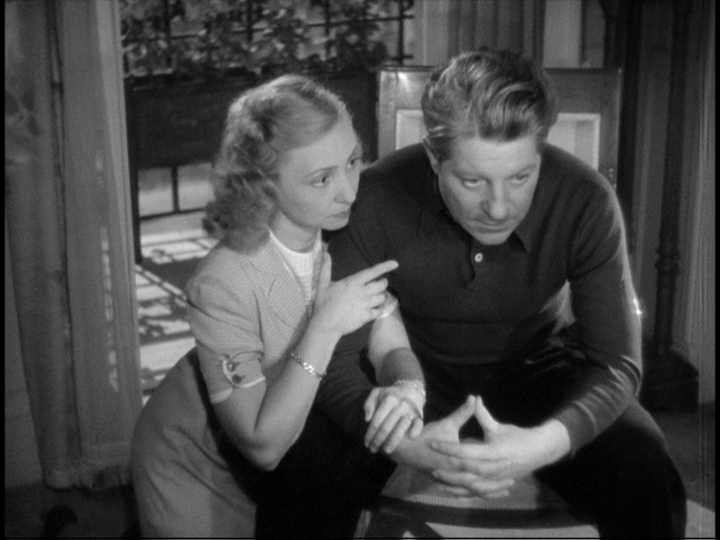Our deep dive with Madison Film Forum into Cinematheque’s Grémillon series begins with one of the last great pieces of poetic realism
Adapted in 1941 from a novel by Roger Vercel, Remorques [literally translated as “Trailers,” and released in the United States nearly five years later under a more marketably operatic handle, Stormy Waters] reunites not only Jean Gabin and Michèle Morgan, co-stars of proto-noir masterpiece, Port of Shadows [Quai des brumes] (1938), but screenwriter and premier name of the poetic realism movement, Jacques Prévert (who revised an original script submitted by Andre Cayette). Positioned at the forefront of a four-week Jean Grémillon retrospective at the Cinematheque that begins September 12 (also Sept. 19, 26, and Oct. 3), Remorques delivers a mercurial tale that swings between the potential peril of a captain’s life off the coast of Brittany aboard his rescue ship, the Cyclone, and the tempestuousness of relationships on land in Brest, France.
Its grandly romantic view of the human condition is attuned to the outer and inner forces of nature, successfully retrofitting a gritty example of occupational hazards at sea in the former half with the heart’s more sensational yearnings in the latter. Beyond the Port of Shadows correlation, Cinematheque regulars may identify this under-known classic in world cinema with a couple of its screenings in the last few years: Josef von Sternberg’s Docks of New York (1928) by course of subject matter, and Alain Resnais’ Hiroshima mon amour (1959) in its proclivity towards lyrical dialogue and fatalistic rhythm. Remorques‘ urgency is further expressed outside its narrative boundaries, as the film’s production was halted by World War II and Nazi Occupation at the tail-end of the 1930s, which created a strange pre-war/post-war division, accidentally complementary to its own tonal shift.
Despite the film’s physical and emotional undulations, it initiates with sweeping eloquence in tracking shots of a celebratory occasion at sailor Pierre Poubennec (Marcel Duhamel)’s wedding reception. Captain André Laurent (Gabin) is called upon to give a toast to the young couple before he is called away by an incoming SOS; the freighter Mirva’s rudder has shattered, and he must assume his post to tow it to land in a raging storm. Grémillon’s ambition to shoot the tossing and turning of the boats off the coast were clearly met with complication by restrictions imposed by German forces in late 1939, which removed all civilian vessels from the sea. The director and his team were relegated to the proverbial bathtub in Paris’ Billancourt Studios to stage the scenes with miniatures. Admittedly, the ship models would never be mistaken for anything to-scale, but their intricate construction paired with a tensely orchestral-choral score by Alexis Roland-Manuel prove the sequences to be more convincing than some of George Lucas’ retroactively integrated computer-generated imagery in THX 1138 (1971) and the original Star Wars (1977). Their inclusion in the film is additionally bolstered by Grémillon’s innovative rhythm of cuts with the orchestration as stokers in the engine room rapidly “feed that fire!”
Halfway through the sea excursion, the attention shifts from the Cyclone’s rescue attempt to the insolence of Mirva captain Marc (Jean Marchat), who’s more interested in cargo reimbursement money than the lives of his own crew, eventually devising a way to avoid paying for salvage once the storm clears by steering away from and severing the Cyclone’s towline. A one-dimensional cold-hearted crook opposite the seemingly benevolent André, Marc is more of a means to introduce his discontent wife Catherine (Morgan), cleverly escaping damsel in distress and siren tropes by independently jumping into one of the Mirva’s lifeboats. She is soon greeted aboard the Cyclone by its captain, where the film maneuvers into the interpersonal concerns of both sexes rather than the men against inhospitable nature.
Following the thirty-minute sea-faring affair, André returns to domesticity’s embrace- his idealistic, jealous, and secretly ill wife Yvonne (Madeleine Renaud). She wants nothing more than to settle down without the constant capsizing of her life due to her husband’s job. Perpetually at his side, the tension in their scenes together is palpable, foreshadowing the film’s drifting towards dreamlike melodrama. The amassing, unspoken pressures between André and Yvonne lure him into the comforts of Catherine, who speaks in cryptic yearnings about the falsity of her forename while teasing ghostly past experiences with unmentionable haunted house films.
André and Catherine’s fated elopement, embodied in the fallen star as a starfish in a beached boat, undoubtedly produces a sense of déjà vu as if they are rekindling the electricity through the same machinations of Jacques Prévert that brought them together a couple years prior as Jean and Nelly, respectively. Carné’s seductively elliptical film is hung up on the divergent definitions of masculine and feminine romance, but Grémillon’s focus is more vast, nuanced, and mature by virtue of the deeper and complicated internal and external conditions and rocky marriages of this French peninsula’s residents. The ravishing push-pull, and the love triangle that emerges despite André’s rationality intermittently intervening, yields an emotionally sincere and unpredictable film brimming with marine imagery crashing into earthy evocations. It is all channeled into André’s expression to his shipmate, Renée Tanguy, both universal and personal: “No one can understand what happens between two people.” With a musical crescendo replete with biblical allusions in voiceover as a “requiem to a lost world,” wrote critic Douglas Messerli, it’s precisely what makes the concise eighty-four-minute Remorques, whether at sea and on land, a piece of epic cinematic poetry.
- Remorques screens on Saturday, September 12, at 7:00p as part of Cinematheque’s Stylish Humanism of Jean Grémillon series at 4070 Vilas Hall. A 35mm print courtesy of the Institut Français will be presented. Admission is FREE.



2 Comments